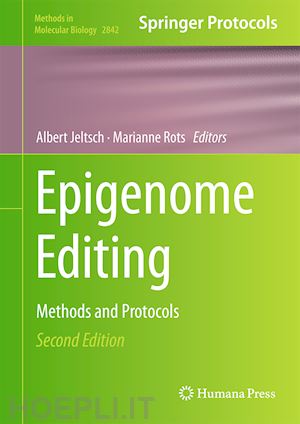
Questo prodotto usufruisce delle SPEDIZIONI GRATIS
selezionando l'opzione Corriere Veloce in fase di ordine.
Pagabile anche con Carta della cultura giovani e del merito, 18App Bonus Cultura e Carta del Docente
This second volume details new and updated methods covering applications of epigenome editing. Chapters guide readers through general and topical reviews, DNA-binding devices, optimization of the effector domains, readout of epigenome marks, and approaches for delivery at the cellular and organismal level. Written in the highly successful Methods in Molecular Biology series format, chapters include introductions to their respective topics, lists of the necessary materials and reagents, step-by-step, readily reproducible laboratory protocols, and key tips on troubleshooting and avoiding known pitfalls.
Authoritative and cutting-edge, Epigenome Editing: Methods and Protocols, Second Editon aims to ensure successful results in the further study of this vital field.
Development of locus-directed editing of the epigenome from basic mechanistic engineering to first clinical applications.- Designing epigenome editors: Considerations of biochemical and locus specificities.- Fine-Tuning the Epigenetic Landscape: Chemical Modulation of Epigenome Editors.- Using high-throughput measurements to identify principles of transcriptional and epigenetic regulators.- Reader-Effectors as actuators of epigenome editing.- Neuroepigenetic editing.- Optimized protocol for the regulation of DNA methylation and gene expression using modified dCas9-SunTag platforms.- Protocol for DNA methylation editing of imprinted loci and assessment of the effects.- Protocol for allele specific epigenome editing using CRISPR/dCas9.- Plant epigenetic editing to analyze the function of histone modifications in gene-specific regulation.- Protocol for efficient generation of chimeric antigen receptor T cells with multiplexed gene silencing by epigenome editing.- Fluorescent reporter systems to investigate chromatin effector proteins in living cells: Applications and protocol.- Plasmid delivery and single-cell plasmid expression analysis for CRISPR/dCas9-based epigenetic editing.











Il sito utilizza cookie ed altri strumenti di tracciamento che raccolgono informazioni dal dispositivo dell’utente. Oltre ai cookie tecnici ed analitici aggregati, strettamente necessari per il funzionamento di questo sito web, previo consenso dell’utente possono essere installati cookie di profilazione e marketing e cookie dei social media. Cliccando su “Accetto tutti i cookie” saranno attivate tutte le categorie di cookie. Per accettare solo deterninate categorie di cookie, cliccare invece su “Impostazioni cookie”. Chiudendo il banner o continuando a navigare saranno installati solo cookie tecnici. Per maggiori dettagli, consultare la Cookie Policy.